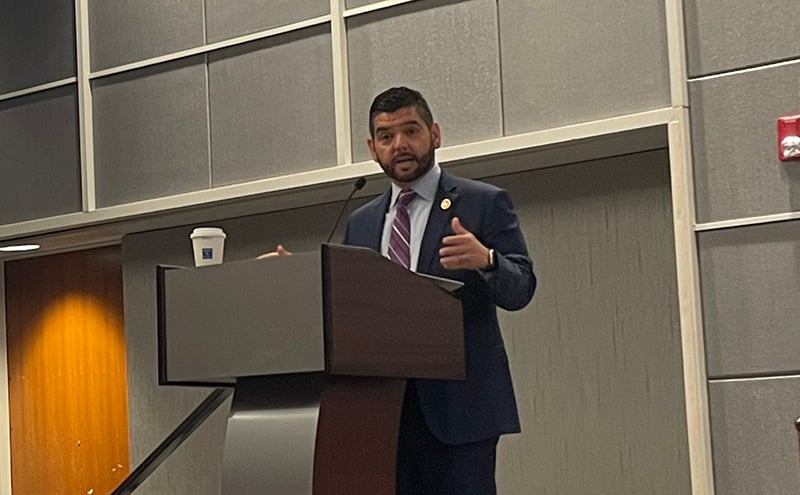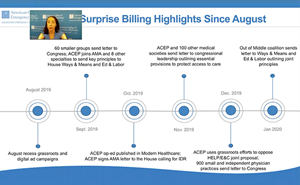Today’s online article covers some highlights from Tuesday, April 16, at the 2024 ACEP Leadership & Advocacy Conference, including the Congressional speakers.
Read more -
12:30 PM
More than 400 emergency physicians went to Capitol Hill and asked Congress to help change the issues that matter most to them. In meetings with their Representatives, Senators and their health care staff members, the attendees asked for support of four different bills –
- Boarding - To help alleviate psychiatric patient boarding, ACEP urges legislators to cosponsor the bipartisan “Improving Mental Health Access from the Emergency Department Act” (H.R. 5414/S. 1346) to ensure appropriate treatment and follow-up care for our patients with acute psychiatric needs.
- Violence in the ED - ACEP urges legislators to cosponsor bi-partisan legislation - the “Workplace Violence Prevention for Health Care and Social Service Workers Act” (H.R. 2663/S. 1176) and the “SAVE Act” (H.R. 2584/S.2768). Congress needs to swiftly consider these bills to help protect you in the emergency department.
- Due Process Rights - ACEP urges legislators to cosponsor the “Physician and Patient Safety Act,” bipartisan legislation to guarantee due process protections for emergency physicians, ensuring that those who provide our nation’s health care safety net can effectively advocate for all patients without fear of retaliation or termination.
- Medicare - ACEP urges Congress to work with emergency physicians to provide long-term stability for Medicare and to support and contribute to ongoing bipartisan efforts to stabilize the Medicare physician payment system.
Read more about the issues emergency physician took to the Hill.
9:40 AM
Holding a cup of coffee in his hand, Rep, Raul Ruiz (D-CA) bounded into ACEP’s Leadership and Advocacy Conference Tuesday morning with the unmistakable energy of an emergency physician.
Rep. Ruiz may have been a member of Congress since 2012, but he has been an emergency physician for years before that.
“I honestly believe that it is a natural progression for physicians to get involved in our patients lives,” Dr. Ruiz said, explaining while he ran for office.
Feeling frustrated by seeing patients who couldn’t afford their prescriptions, who don’t have insurance, who can’t see specialties because they aren’t available in their communities, Dr. Ruiz decided to get involved.
“The focus has always been to work to improve health, health care access, and empower physicians to be able to provide better care for their patients,” he said. ”And with that, we have had some great successes.”
Dr. Ruiz helped repeal the Independent Payment Advisory Board (IPAB), a part of the Affordable Care Act, after that board did not include any physicians who would determine decisions about reimbursement.
He is also working diligently on repairing surprise billing reform and repair a flawed implementation that gives unequal weight to some criteria during the dispute resolution processes.
“One of the things we've learned is how much we need to stay engaged, stay vigilant and do the work that you're doing now,” Rep. Ruiz said. “This is not the intent of the law. I know, I wrote it. But I think that the courts are making (the regulatory agencies) re-evaluate and go back to the drawing board frequently. And I'm hoping that they come back with a better picture.”
Dr. Ruiz also went over a few of the bills the members would be advocating for later that afternoon when they made their Hill visits.
The Physician and Patient Safety Act is bipartisan legislation designed to guarantee due process protections for emergency physicians, ensuring that those who provide care for all patients can do so without fear of retaliation or termination.
The Improving Mental Health Access from the Emergency Department Act would ensure appropriate treatment and follow-up care for our patients with acute psychiatric needs.
And then the last bill Rep. Ruiz encouraged the attendees to find support for was the Strengthening Medicare for Patients and Providers Act, which would tie physician reimbursement to the medical economic index (MEI) to eliminate cuts, offer baseline pay and ensure reimbursement reflects the cost of care.
“For the love of God, let's put an end to the annual threats of Medicare cuts,” he said. “I know you are anxious. Every year, I get anxious. And then I get double anxious when I get your anxiety coming to me about writing another letter about going at the leadership to either delay or dismiss or mitigate the effects by making it less painful. So, let's fix it once and for all.”
8:50 AM
American politics has always had an edge to it, but pundit Mo Elleithee said there are some reasons why it feels worse these days than ever before.
“We've only had one non-partisan president in the history of the Republic. And in the race to succeed him between John Adams and Thomas Jefferson, Adams and Jefferson called each other liars, thieves, scoundrels and frankly, some other words that make today's politics actually seem tame,” he said.
And it’s not just you who feels the difference, said Mr. Elleithee, Executive Director of Georgetown University's Institute of Politics and Public Service.
“When we asked people on a scale of zero to 100, what is the level of division in this country? Zero would be no division and 100 being the edge of Civil War, the mean response is about 73,” he said. “Americans believe we are nearly three quarters of the way to civil war. That is not optimistic.”
There are several reasons for this feeling, he explained.
The last time the political rhetorical was similarly polarized was over a century ago, when we were moving from an agrarian society to an industrial society, which caused social, cultural and economic anxieties that lead to political anxieties. Today, Mr. Elleithee explained, we are moving from an industrial society to a digital/information society, which also comes with similar social, cultural and economic anxieties that lead to political anxieties.
He also said we are experiencing “the big sort,” the idea that increasingly people are moving into neighborhoods where there are other people who look and think like they do.
“What happens when we isolate ourselves from other perspectives? We can't understand those other perspectives. What do we do when we can’t understand something? Too often we vilify it,” he said.
Additionally, Mr. Elleithee said there are only two institutions that currently have a net positive trust rating – the military and firefighters (nurses did pre-COVID, he noted).
“We have stopped trusting the institutions that we have relied on to look out for us,” he said.
Another reason the political landscape seems particularly rough is that “our information ecosystem is way out of whack right now,” Mr. Elleithee said.
“The complication of living in this digital age, where information is flowing at speed and scale unlike any moment in human history before, is we can't keep up with it … (and) we sure as hell can’t fully keep up with the misinformation and the disinformation,” he said. “We do not currently have the tools and the bandwidth and, sadly, too often the desire to tackle that issue.”
Mr. Elleithee added that the public is essentially rewarding the polarizing behavior, though, by clicking on articles and donating to candidates who provide outrageous content, for example.
One reform that Mr. Elleithee said could help reduce the polarization is non-partisan redistricting.
“Because when we look at the examples about members of Congress saying outlandish things, why can they afford to do that? Because they don't have general election challenges,” he said. “We have completely shrunk. Competitive House districts, there just aren't as many as there were two decades ago, so the only competition is in the primaries.”
Despite it all, though, Mr. Elleithee said, “I'm still bullish on democracy, but we have to be better at it.”
The timing of Mr. Elleithee’s discussion on the events shaping the current American political landscape came right after ACEP President Dr. Aisha Terry had a conversation with Rep. Greg Murphy that focused largely on his controversial legislation opposed by ACEP, that would eliminate federal funding to medical schools with DEI offices or initiatives.
Near the end of his session, Mr. Elleithee noted that having a controversial speaker can be educational. Last week, he received angry emails from Georgetown alumni after having Kevin McCarthy on campus – but none from students.
“The way I think about it, I wasn't giving Kevin McCarthy a platform, I was giving my students a platform to engage with him,” he said. “Just as today you were given a platform to engage with the Congressman. I think that's a beautiful thing that we are not doing enough of in our politics today.”
8:15 AM
After in depth consideration by the ACEP Board, debate on social media channels, and a session restructure with a face-to-face interaction, Rep. Greg Murphy (R-NC) arrived Tuesday morning at ACEP’s Leadership and Advocacy Conference to address several legislative efforts.
A noticeable number in crowd of more than 400 LAC attendees wore hats with the ACEP Diversity, Inclusion & Health Equity (DEI) Section logo in opposition to Rep. Murphy’s proposed EDUCATE Act, which would eliminate federal funding to medical schools with DEI offices or initiatives.
“As you know, ACEP doesn't support the bill, because it's really directly counter to our policies around DEI, which is a fundamental necessity in the emergency department,” said ACEP President Aisha Terry, MD, MPH, FACEP, who led the conversation with Rep. Murphy. “We literally thrive on a mission to care for the most vulnerable and underserved populations.”
“Every emergency physician in this room sees up close and personal how some groups consistently fared worse, in our society and in this country. And those outcomes are not solely based on just the clinical care that we provide.”
Dr. Terry repeatedly expressed to ACEP members her intent to use the session to hold Rep. Murphy accountable and create a platform for emergency physicians to explain to him the error in his proposed legislation.
Rep. Murphy said, “When you walk into a patient's room, do you care what color that patient is? Or does that patient, more importantly, care what color you are? If your child is going to have heart surgery the next day, who do you want taking care of your patient? You want the best qualified.”
He added that he is concerned that academic tests are biased and include social justice content beyond science, and that students and professors are being asked to take oaths around diversity.
Questions from the audience were limited by time constraints. EMRA President Blake Denley, MD asked, “How can you support federal government’s interference in medical education that would prohibit the medical community’s efforts to develop a diverse group of leaders with data driven efforts?”
Ugo A. Ezenkwele, MD, FACEP, Chair of the Diversity, Equity and Inclusion Committee asked “How do you explain the disparities in health care that we see that have been well documented in regard to access to care, decreased overall life expectancy, increased maternal and infant mortality rates that … disproportionately affects communities that have been historically marginalized and is directly related to their zip code?”
Rep. Murphy did not directly answer the questions directed at him and simply repeated his generalized concerns about politics in medicine.
Dr. Terry, ACEP's first Black president, said she grew up in a nuclear family in the county Rep. Murphy represents, and having graduated college and earned her advanced degrees, she still has a pregnancy-related mortality risk two to four times that of a white woman who has just a high school diploma.
“When we have those disparities, that's a flaming red flag that something is wrong with the system. There is an urgent problem, Congressman, that needs to be addressed. And I do believe it is linked to diversity bias and cultural competence to some degree,” Dr. Terry said.
“I know there's not enough time today to solve this problem. But how can we start a dialogue with you to share why DEI does matter, the positive impact that it has had on medicine?,” Dr. Terry asked. “Would you consider reviewing and revising, even, the EDUCATE Act?”
While Rep Murphy did imply an openness to “work with people all the time to make federal legislation” his offer appeared conditional with a caveat that he would “not compromise in putting any politics in medicine.”
Because of ACEP’s commitment to offering a strong counter to the EDUCATE Act, we have created a form to capture our members thoughts on the proposed bill at www.acep.org/useyourvoice and ensure they are sent unedited to Rep. Murphy’s office.





